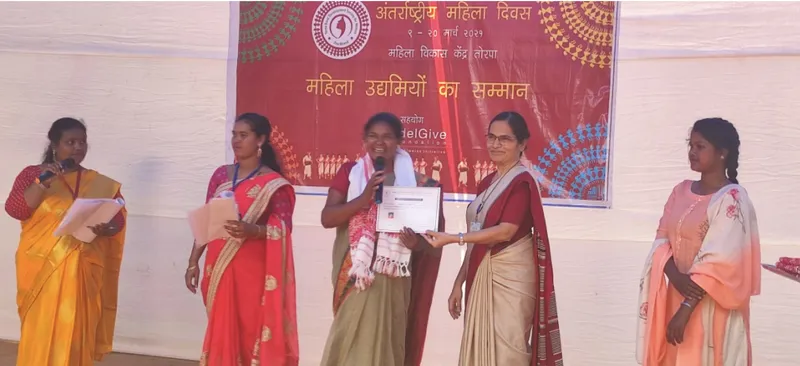This 'Mask Didi' from Jharkhand is helping women in her village gain financial independence
Jublina Kandulna, also known as Mask Didi, started making masks to sell across villages in her rural block. Today, she is helping other women become financially independent
The inhabitants of Jharkhand’s Ambatoli village are primarily small landholders. Despite getting heavy rains in the monsoon, the land is largely not cultivable, and the villagers have had to seek parallel sources of income.
Jublina Kandulna started a small tailoring business to supplement the money her family earned from their land to help make ends meet.
Soon, her tailoring micro-business was the main income generator for the family of six, comprising Jublina, her husband, their two children, and her in-laws.
“My husband and I used to work in the field, but our land is too small to help feed the family. That’s why I started taking tailoring orders,” says 45-year-old Jublina, adding that the entire responsibility for the family rested on her and her husband Vimal.

Jublina Kandulna (centre) or Mask Didi as she is known being felicitated for empowering rural women on International Women's Day
She says that the tailoring business alone would bring in an income of Rs 9,000 each month.
“Things were going very well until the COVID-19 outbreak, and the orders started drying up. It was a very hard time during the lockdown. I had to shut down my business completely,” she says.
Jublina decided to attend a Torpa Rural Development Society for Women (TRDSW) training on micro-entrepreneurship. She says the training helped her see an opportunity when the government enforced rules about wearing masks.
“The government told us that the usage of masks was essential to stay safe against COVID-19. I realised that masks were not easily available in our remote village,” she says, adding that the training team encouraged her to start stitching masks on an immediate basis.
Jublina first started stitching masks from the leftover material from the clothes she used to make. However, people were not buying these masks because they did not believe the virus posed a threat.
“The TRDSW team held awareness drives at the village and taluk level. They told the villagers that the government wanted everyone to wear a mask as a protection against COVID-19,” says Jublina.
“I began by stitching only 20 reusable cloth masks. They sold out at Rs 20 per piece in Ambatoli village, and I earned Rs 400 from that,” she adds.
And, when the word got around, more people started placing orders for masks. “Soon, I was stitching 50 to 100 reusable cloth masks per day and sold them not only in Ambatoli but also in nearby villages. People started calling me ‘Mask Didi.’
My husband started helping me, and we are now selling masks across 30 villages from Dimbukel to Baghiya. We travel on foot and by bicycle in the heat and the rain to sell them,” she says.
The terrain can also be a challenge as the area has no proper roads, is hilly, and largely made up of forests. However, the couple’s perseverance has paid off, and they now earn Rs 20,000 a month. Jublina also distributes free masks to children, widows, and the elderly. As a result of her success, she has now decided to empower other women in the community and has started coaching classes in tailoring pants, nightwear, etc.
She is also conducting micro-entrepreneurship programmes for women who want financial independence and has joined the Edel Baha SHG.
In fact, she has diversified her source of income by joining the savings and credit scheme in the SHG and is also training in leaf plate making.
“I want to avoid any financial issues in the future. I have also set up a tailoring centre in Koytoli to help others achieve the same,” she says.
Edited by Suman Singh







